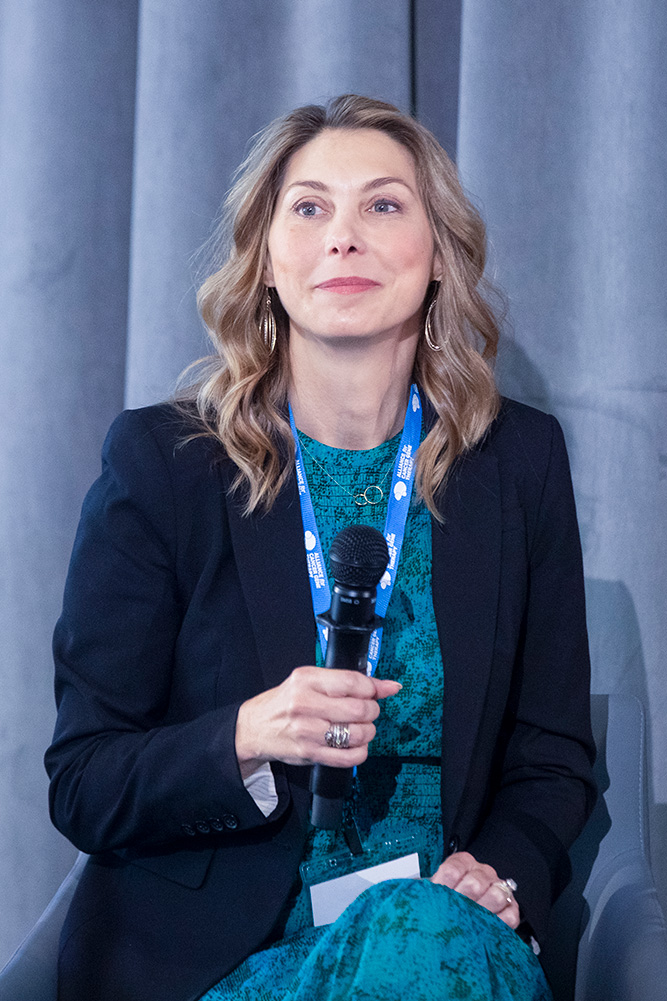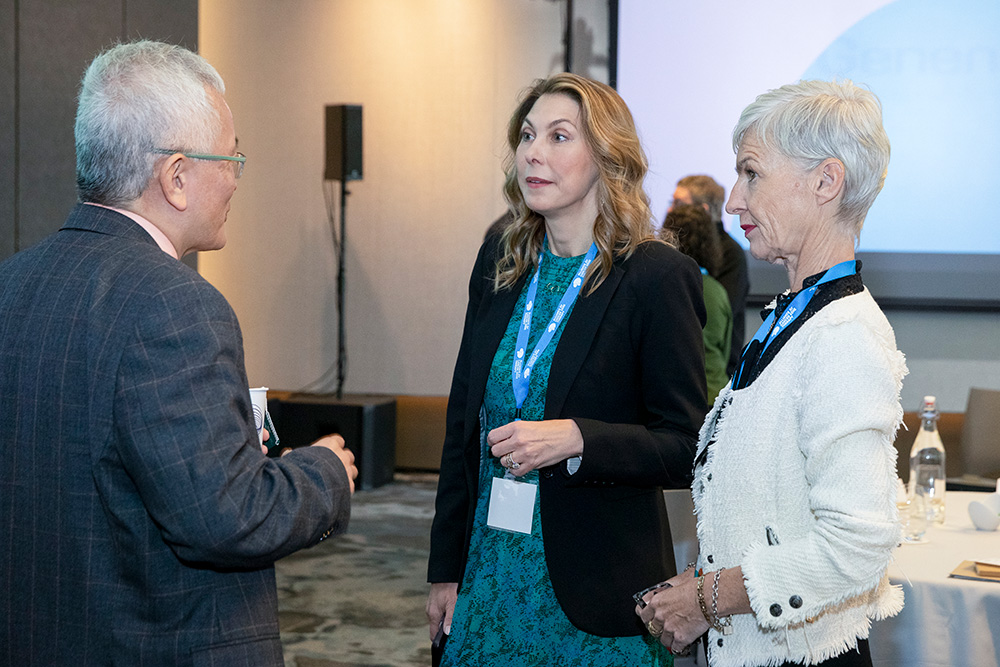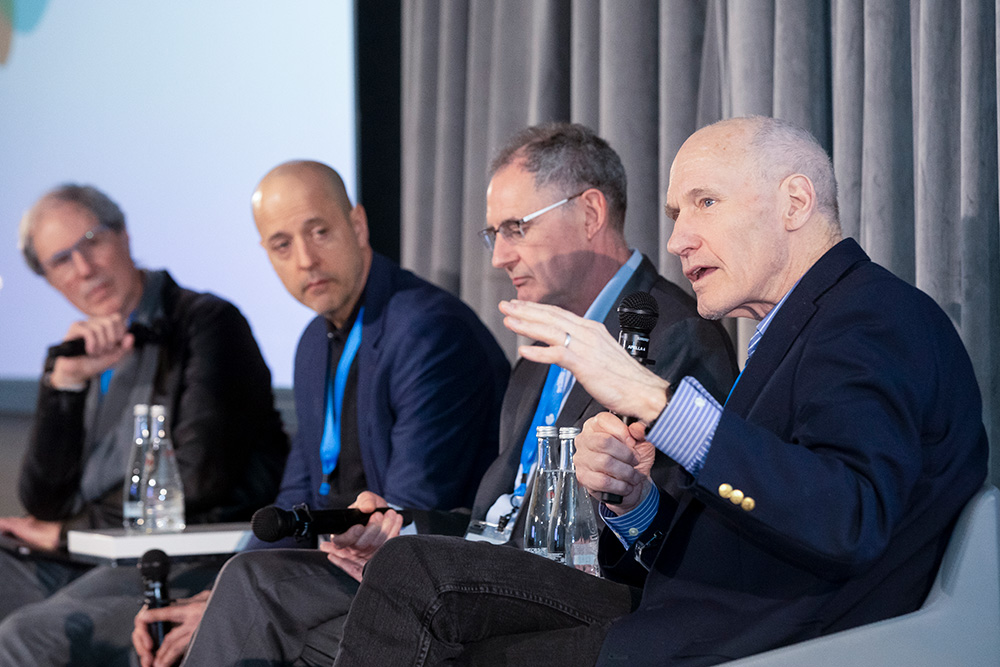
On March 29, Alliance for Cancer Gene Therapy presented its annual scientific summit – ACGT Summit 2024 – an invitation-only gathering bringing together top scientists in cancer cell and gene therapy. The day-long event held in New York City featured ACGT Research Fellows, ACGT Scientific Advisory Council members, biotech and pharma experts, and industry thought-leaders.
The agenda for ACGT Summit 2024 was curated to provide a collaborative environment encouraging scientists to share developing ideas among their peers to achieve breakthroughs in cell and gene therapy research for difficult-to-treat cancers. Presentations and panel discussions included the innovations and challenges of developing cell and gene therapies for pancreatic cancer and brain cancer, the translation of new therapies from the academic laboratory to biotech, and a look ahead to what’s next in the evolution of cell and gene therapies for solid tumors.
“This was my first time attending an ACGT Summit, and I was incredibly impressed by the quality of the discussions. I think what’s important for us as scientists is having this open discussion about the problems. Often you go to meetings and people stand up in front of a big crowd and give presentations with tons of data, but they’re missing that collaborative discussion about problems, issues and where we see the field going. The open discussion and exchange of ideas at ACGT Summit 2024 is what I found so impressive.” — Katy Rezvani, MD, PhD (The University of Texas MD Anderson Cancer Center)
“The ACGT Summit stands out as a premier cell and gene therapy scientific event for three reasons,” said Bruce Levine, PhD (University of Pennsylvania). “First is the caliber of the scientists attending, second is the intimate nature and third is why ACGT was created in the first place.”
ACGT was founded in 2001 by Edward and Barbara Netter after their daughter-in-law died of breast cancer. She struggled with harsh treatments such as chemotherapy and radiation, which inspired the Netter family to fund innovative scientists who were trying to develop novel immunotherapies that harness the power of the immune system to destroy cancer without harming healthy tissue.
“ACGT was founded by the family of a cancer patient and we see that to this day – the involvement of patients and their families with ACGT and now participating in the ACGT Summit,” Dr. Levine said. “It really brings us back to why we as scientists are doing the research and the clinical trials: tackling these challenges that patients and their families are facing with difficult-to-treat cancers.”
Keynote speaker shares how CAR T-cell therapy gave her child precious years of life.

Caroline Corner, PhD, the mother of a CAR T-cell therapy patient, told the story of her son Callum “Cal” Miller’s fight with a rare and aggressive type of lymphoma.
In her keynote presentation, she explained how Cal first complained of headaches a few days before his 11th birthday in 2017. He was eventually diagnosed with primary central nervous system (CNS) lymphoma, which is a blood cancer limited to the cranial-spinal axis, including the brain, spinal cord, cerebrospinal fluid, and vitreoretinal space. It is an especially rare cancer in children, and the survival rates are poor.
Cal received chemotherapy and a stem cell transplant, neither of which worked long-term. With no other approved options, Caroline learned of a clinical trial at University of California, San Francisco using CAR T-cell therapy, a type of cell and gene therapy in which T cells are genetically modified to target cancer cells expressing a specific protein.
While the trial was initially for children with leukemia, scientists wanted to test the therapy on lymphoma. Cal joined the trial and received his CAR T cells in June 2020, experiencing much gentler side effects than prior treatments, and within a week, scans showed the tumor was gone.
“We went on vacation that August and Cal’s father took an awesome picture of Cal gleefully launching himself from a boulder into a river near Lake Tahoe,” Caroline said. “He posted the photo on his LinkedIn account with a heartfelt message of ‘thanks’ for all the researchers fighting for kids like ours. The post was quite popular and it soon spread to thousands of people, including scientists and doctors. We didn’t know them, but they commented on the post about how happy they were seeing a CAR T-cell kid finding joy after treatment.”
After nearly three years of hospital visits, treatments and side effects, that vacation was the start of Cal living the life of a regular teenager. For the next two years, he took vacations, enjoyed parties, went skiing, visited with friends and began high school.
According to Caroline, the primary lingering effect of Cal’s treatment was a loss of appetite. He had no desire to eat “more than a bite or two” of any food. Just before his two-year post-treatment check-up in the summer of 2022, Cal stopped eating entirely. During an urgent care visit, a scan showed a new tumor.
“Cal enthusiastically wanted to receive CAR T-cell therapy again, because that was his easiest option before.” — Caroline Corner, patient advocate and mother of a CAR T-cell therapy patient
However, Cal’s family had difficulty finding a clinical trial that would accept him. Then Cal’s father remembered the LinkedIn post with the many responses from scientists and he began messaging them to ask for help.
Cal‘s family was connected to doctors running a clinical trial using a CAR natural killer (NK) cell therapy, which works similarly to CAR-T but uses a different type of immune cell. Unfortunately, before receiving the CAR NK cells, Cal suffered a serious infection and died of multiple organ failure on Dec. 13, 2022, exactly five years to the day of his initial CNS lymphoma diagnosis.
Caroline told the ACGT Summit 2024 audience that she does not know why Cal‘s CAR T cells did not continue working but that the therapy gave her son two precious years of cancer-free life that he likely would not have enjoyed otherwise. Cal’s final gift of love was to donate his tumor tissue to research labs around the world to help develop new therapies to save the lives of future kids with cancer.
“I hope Cal’s two-year remission from CAR T-cell therapy is explored so another person gets four years, or a lifetime.” — Caroline Corner, patient advocate and mother of a CAR T-cell therapy patient
Caroline also hopes that the collaborations and connections fostered between scientists at ACGT Summit 2024 will continue to advance new cell and gene therapies for cancer.
“Cal’s story is a call to action,” Caroline said. “We still have a lot of work to do here. There are mysteries to solve and therapies to improve and we need more connectivity – of patients, doctors, researchers and caregivers. It’s in rooms like this at the ACGT Summit where that connectivity happens. We’ve seen it happen all day, today.”
Drs. Carl June and George Yancopoulos share glass-half-full perspectives on achievements and next-step challenges in cancer cell and gene therapy.
ACGT Summit 2024 included a conversation with two trailblazers in the field of new medicines: ACGT Research Fellow and ACGT Scientific Advisory Council member Carl June, MD (University of Pennsylvania), and ACGT Scientific Advisory Council member George Yancopoulos, MD, PhD (Regeneron Pharmaceuticals). They discussed and debated the accomplishments of the field so far and the obstacles they must overcome to achieve the next breakthroughs in cancer treatment.
Twenty years ago, ACGT funded the research by Dr. June that led to the first FDA approval of a CAR T-cell therapy for cancer. There are now six CAR T-cell therapies approved for patients with specific types of blood cancers.
“If not for ACGT,” Dr. June said, “none of this would have happened.”
Researchers are now striving to achieve similar breakthroughs for people with solid tumors, such as brain cancer, lung cancer, ovarian cancer, pancreatic cancer, prostate cancer and sarcomas.
“We have to balance how far we’ve come and the incredible advances we’ve made with how far we still have to go. These advances provide hope and promise, but we need the next generation of scientists to be inspired to face the next challenges.” — ACGT Scientific Advisory Council member George Yancopoulos, MD, PhD (Regeneron Pharmaceuticals)
Dr. June and Dr. Yancopoulos examined the potential of combining cell and gene therapy approaches while protecting healthy cells from an overstimulated immune system. While cell and gene therapies such as CAR T-cell therapy often cause less severe side effects than chemotherapy and radiation therapy, scientists still must maximize their safety and prioritize patient quality of life.
“You want to hype the immune system up to attack cancer and then calm it down before it attacks the rest of the body,” Dr. Yancopoulos said.
The pair ended the session by saying they both have glass-half-full mentalities about the future of cell and gene therapy, and they trust that scientists will continue to innovate new ways to attack difficult-to-treat tumors.
Scientists emphasize the need to focus on brain cancer and pancreatic cancer.
Two ACGT Summit 2024 panels focused on the challenges and innovations in developing cell and gene therapies for pancreatic cancer and brain cancer. Combined, these two solid tumor cancers are responsible for approximately 80,000 new diagnoses in the U.S. each year, have poor survival rates, and present unique obstacles for treatment.
The pancreatic cancer panel featured ACGT Scientific Advisory Council Chair Michael T. Lotze, MD (University of Pittsburgh), Ben Z. Stanger, MD, PhD (University of Pennsylvania), and Eileen O’Reilly, MD (Memorial Sloan Kettering Cancer Center).
They discussed the complexities of treating pancreatic cancer, including difficulties with early detection, the immune-suppressive environment surrounding pancreatic tumors, and comorbidities such as diabetes and weight loss. They also highlighted progress in finding universal protein targets, improvements in survival rates and ways to combine cell and gene therapy with other promising treatments.
“Just in the last few years, we’ve gone from a single-digit 5-year survival rate to a double-digit (13 percent) 5-year survival rate,” Dr. Lotze said. “Surgery is the single major curative approach, but only 20 percent of patients can have surgery. If the tumor can be resected, then great. For the other 80 percent of patients, though, I’m a big believer in using T cells. I don’t think we’re going to be able to cure cancer, including pancreatic cancer, without the help of T cells.”
There’s also exciting potential in the use of vaccines to treat this disease. Dr. O’Reilly told the audience how two recent studies at Memorial Sloan Kettering Cancer Center are using mRNA technology to create vaccines that prevented tumors from returning after surgery. One vaccine is personalized for each patient while the other targets the protein KRAS, which is expressed by most pancreatic cancer tumors. Dr. O’Reilly told the ACGT Summit audience that both vaccines are moving forward to phase 2 clinical trials.

The brain cancer panel featured ACGT Research Fellow and Scientific Advisory Council member E. Antonio Chiocca, MD, PhD (Brigham and Women’s Hospital), and ACGT Research Fellows Hideho Okada, MD, PhD (University of California, San Francisco), and Juan Fueyo, MD (University of Texas MD Anderson Cancer Center).
All three received ACGT Research Grants in 2023 and are seeing promising results in clinical trials using CAR T cells and oncolytic viruses to treat glioblastoma and other brain tumors.
“Rarely have we studied how the tumor responds to a treatment,” Dr. Chiocca said. “We need to understand from patients what is happening and how the tumor is evolving, and I think that is key to us moving forward with treating this disease.”
“How do we deal with the toxicities, and how can we develop a therapy that patients can tolerate for a long time? That’s a key issue.” — ACGT Scientific Advisory Council member and Research Fellow E. Antonio Chiocca, MD, PhD (Brigham and Women’s Hospital)
“Giving patients potent cell and gene therapies can be a double-edged sword,” Dr. Okada said. “How do we deal with the toxicities, and how can we develop a therapy that patients can tolerate for a long time? That’s a key issue.”
Scientists explore emerging potential of in vivo cell and gene therapies.

Recent progress and potential advantages for patients in developing in vivo cell and gene therapies was presented by ACGT Research Fellow and ACGT Scientific Advisory Council member Carl June, MD (University of Pennsylvania), ACGT Scientific Advisory Council member Stephen Russell, MD, PhD (Vyriad), and Andrew Scharenberg, MD (Umoja Biopharma).
All three panelists are working on new in vivo strategies to genetically engineer immune system cells without removing them from the patient’s body.
The FDA currently requires that immune cells be removed from a patient, genetically modified in a laboratory and returned by infusion to the patient’s blood.
While it was acknowledged that in vivo cell and gene therapies could deliver therapy to patients faster and reduce manufacturing costs, it was noted that doing so will require overcoming challenges in dosing to achieve effectiveness while remaining safe.
Better together: collaborations between academic institutions and biotech companies.

In the final session of ACGT Summit 2024, six successful collaborators highlighted the need to foster scientific collaborations to translate cell and gene therapies from academia to biotech. The panel comprised ACGT Scientific Advisory Council member Katy Rezvani, MD, PhD (The University of Texas MD Anderson Cancer Center), and Lachlan MacKinnon (Replay Bio); Christopher Klebanoff, MD (Memorial Sloan Kettering Cancer Center), and Loic Vincent, PhD (Affini-T Therapeutics); and Cristina Puig-Saus, PhD (University of California, Los Angeles), and Jonathan Benjamin, MD, PhD (ImmPACT Bio).
Often, novel therapies are conceptualized by scientists at academic institutions, but they must work with biotech companies to complete clinical trials with patients and then manufacture and distribute the therapies to patients who may benefit from them.
“We are all learning together,” Dr. Klebanoff said. “Academic scientists and biotech scientists are all learning from each other’s wins.”
“The ability for us to work together allows us to make an impact in a shorter amount of time rather than needing, say, a 30-year line of sight,” Dr. Puig-Saus added.



